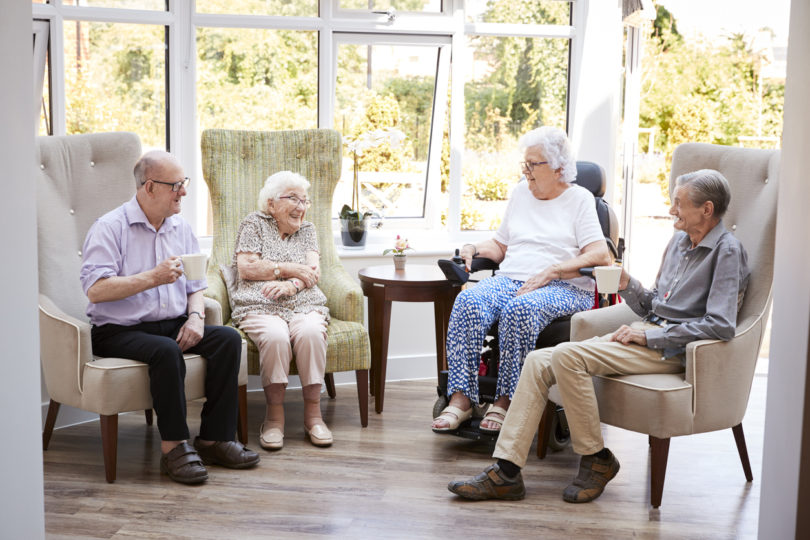When Betty Golden no longer wanted to travel, her husband knew it was the beginning of her slip into dementia.
The college sweethearts had traveled around the world, to places such as Europe and Australia, when a long-awaited trip to Singapore was nearing. At almost the last minute, Betty didn’t want to go. The trip was cancelled.
“She was secure in her own little world,” recalls John Golden. “The world got very small.”
For about a year and a half, John tried to take care of his wife by himself in their Williamsburg home. “We struggled through trying to care of our problems at home,” he recalls. “The problems never got better; they just got more abundant.” Eventually it got to be too much for him, and he had to make the difficult decision to move her to a place that provided more care.
It’s a decision that affects many caregivers, and it’s a tough one, says Marilyn Gray, executive director of WindsorMeade, a retirement community in Williamsburg. It’s important for caregivers to realize their own limitations, and to remember to look after themselves.
“So often, the caregiver does neglect their own needs, until they collapse,” Gray says. “You’re not doing [your loved one] a favor if you become sick yourself.” At WindsorMeade, “the resources are here but for the asking.”
WindsorMeade Williamsburg is a continuing care retirement community that offers assisted living, memory support, skilled nursing and rehabilitation services on its sprawling property off Monticello Road. Its 18-bed memory care residence — called Manchester House — is designed for those dealing with the challenges brought on by Alzheimer’s and related dementias.
Manchester House focuses on resident’s personal interests, and offers a variety of programs, including music and art programs that help spark memories and improve socialization and responsiveness. Sometimes, the staff will just gather residents together for a recollection session of times gone by.
For John Golden, a former hospital administrator, the decision to move his wife to a place where she would receive more care was a tough one, but necessary. After retiring from Philadelphia, the Goldens had been living in the Villas at WindsorMeade — independent residences on the sprawling WindsorMeade campus — for about seven years when Betty needed open-heart surgery. About a year afterward, she started having memory problems.
The problems continued. Betty, a former school administrator, stopped sleeping. Her personality began to change. She was beginning to slip away. “It got overwhelming,” John recalls. “It just wears you out.” So on May 1, 2014, with the help of his children, he moved Betty into WindsorMeade’s skilled nursing residence — now called Hadley House — and settled into a routine of visiting every day.
Sadly, Betty died in 2018. She and John were married for 61 years; together since their first day at Juniata College in Pennsylvania when they met during a social exercise. All the girls put a shoe in a pile, and the boys had to pick up one. John picked up Betty’s.
“I couldn’t ask for anything more in terms of care,” John says. “There are some wonderful, wonderful people here at WindsorMeade. They really help you pull through some difficult times.”
Recently, John answered a few questions for other residents at WindsorMeade during a special program called “Forget Me Not.” WindsorMeade staff hopes to regularly offer similar programs for their residents and the community on pertinent topics.
Here are a few of the questions and answers:
Q: How do you recognize when a loved one is starting to decline?
It’s not easy, John admits. “People with dementia have a way of covering up shortcomings,” he says. But there are little things to watch for. They might want to stay home more often, where it’s familiar. They might become more quiet. When talking to someone, they might repeat questions back.
Q: What would you want other caregivers to know?
“The term caregiver should not be thrown around lightly,” John says. “It’s a very, very difficult job. In the beginning, you’re angry. You’re guilty. You go through a whole range of things. But you’re also an advocate for your loved one,” checking in with doctors, nurses, aides, etc.
Also important, he adds, is to take care of yourself and to keep having a life. “You hear that all the time, but it’s so easy to lose track of yourself,” John says. Keep up with friends, he suggests: Now 84, John, who still lives at WindsorMeade in his home in the Villas, has maintained an active lifestyle, going to activities and traveling with friends.
Q: What help did you accept?
Socialization. “Getting your mind cleared,” John says. “It seems so simple to say that friendship, just going out to dinner or lunch, can mean so much.”
Gray suggests that people look out for one another, to keep a careful eye especially on spouses who are acting as caregivers. “You don’t know what’s going on behind closed doors sometimes,” she says. It can be hard, particularly for men, to make and maintain those bonds of friendship as they lose their relationship with their spouse. Loneliness can creep in.
“If you see someone without support, let the clinic [at WindsorMeade] know,” Gray suggests. “They can help.”
Q: How do I support my parents?
John: “Give them your love.”
Interested in learning more about Manchester House? Talk to one of their Certified Dementia Practitioner Retirement Counselors at 757-941-3615. To learn more about WindsorMeade of Williamsburg, visit www.windsormeade.org or call 866-403-5503.

